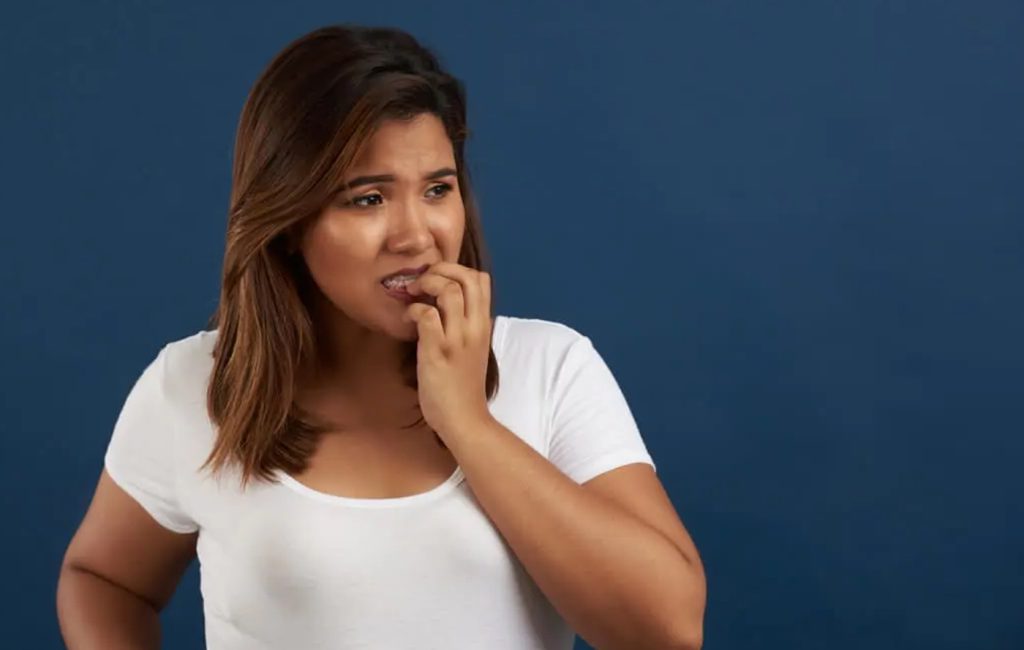Jackie has dealt with uterine fibroid pain long enough. She decides it’s time to stop suffering and seek help from someone who can nip everything in the bud. She wants to get back to living the life she deserves. There’s just one problem—she’s afraid of fibroid surgery. It doesn’t matter how many successful surgeries she reads about or how many times her doctor insists that her case is easy. She wants nothing to do with going under the knife and the potential post-procedure problems that may follow. As a result, she wonders, “What else can I do about my fibroid pain?”
Being afraid of fibroid surgery is common for women suffering from fibroid pain, especially when they feel like they’re being painted into a corner. But it’s important to realize that while procedures like hysterectomy and myomectomy are the right option for some women, that’s not the case for every patient.
Women May Delay Fibroid Treatment Because of Fear
If you’re having similar fears like Jackie, you’re not alone. Researchers estimate 70-80 percent of all women develop fibroids between 35 and 54. However, fibroids can occur in women younger than 35 and until menopause. Historically, the medical community’s answer to fibroids has been fibroid removal through bloody and complex surgeries such as hysterectomy and myomectomy. In fact, in the United States 600,000 hysterectomies and approximately 30,000 myomectomy surgeries are performed annually.
Not all fibroids cause symptoms. Women who do experience symptoms may encounter the following:
- Heavy menstruation
- Back or leg pain
- Periods that last longer than a week
- Heavy bleeding (which can be heavy enough to cause anemia)
- Pelvic pain or pressure
- Urinary frequency
- Pain during sex
- Constipation
But not everyone wants or needs to have fibroid surgery. In fact, women can experience uncontrollable fear and anxiety over any treatment that could change their lives. As a result, they put fibroid treatment off for years because of fear. A uterine fibroid research study conducted by experts from the Mayo Clinic, the Cleveland Clinic, and the University of North Carolina found that women delayed seeking fibroid treatment for an average of 3.6 years, with nearly a third waiting more than 5 years. Most of this was due to fear and lack of knowledge about fibroid treatment options.
Additionally, one survey that included 730 women did a deep dive into more reasons for these fears and concerns. The study cited that most ranged from fears over not being able to get pregnant or having a difficult delivery while older patients were more concerned with general health and significant blood loss. The study went on to state that due to the benign nature of uterine fibroids and their treatability, fibroid-associated fears are generally unfounded. But that should not undercut this fact: these are real women with real fears that must be validated rather than swept under the rug.

Having a fibroid doctor in your corner—someone who is open to back-and-forth dialogue, answering every question or concern, setting expectations along the way, and honoring a patient’s wishes—is one significant way to help you feel more in control and have less fear of fibroid treatment. Another is the uterine fibroid embolization (UFE) procedure, which by itself is a simple solution to addressing fears women face concerning fibroid surgery.
Simplifying with UFE: An Alternative to Fibroid Surgery for Fibroid Pain
Uterine Fibroid Embolization (UFE) is a minimally-invasive alternative with no incisions, no hospital stay, faster recovery time, and less post-procedure pain than you think—especially with supportive fibroid doctors managing your care.
Imagine Living Free of Fibroid Pain Thanks to These UFE Benefits at Fibroid Institute Dallas
UFE is equally as effective at eliminating fibroids and fibroid pain, but unlike its counterparts, it is not fibroid surgery. Rather than remove fibroids, UFE shrinks them. By doing so, a woman such as Jackie, who is afraid of fibroid surgery, can avoid all of that but still achieve highly successful results.
Here’s how it works: Our very own Dr. Suzanne Slonim inserts a small catheter by way of a tiny needle into the radial artery on the patient’s wrist and advance the catheter to the uterine arteries and veins feeding the fibroids. Then small particles are injected to block blood flow to the fibroid tumors, causing them to shrink and die. Patients can expect an easy procedure performed under local anesthesia or moderate sedation. The procedure will last about one hour. Once you wake up, you’ll notice only a small bandage over the nick on your wrist.
What Can I Expect for My Fibroid Pain After UFE?
It’s important to work with interventional radiologists like our fibroid experts who specialize in UFE. We go over and above to ensure successful outcomes and post-procedure pain management.
From a procedure-prep and post-procedure standpoint, Fibroid Institute Dallas has developed a highly specific formula. As a result, our patients report little to no pain when they follow the recommended medicine chart. Furthermore, patients can expect to have regular monitoring with us. We make ourselves available—day or night—on the off chance that a patient needs our help or guidance.
Most women who choose UFE get back to work and their normal activities between 7 to 10 days after the procedure, which is a much shorter recovery time compared to fibroid surgery. As you’re recovering from UFE, you may continue to feel your uterus cramp for about 5 days after the procedure. You may also feel tired, have a low-grade fever, and vaginal spotting. All symptoms should lessen each day, getting you back to your normal routine after a week or two.
The best news is as months go by, you’ll notice that many of your uterine fibroid symptoms are drastically getting better or disappearing altogether!

Improve Your Life from Fibroid Pain at Fibroid Institute Dallas
Do you have fibroid symptoms? Are you interested in learning more about UFE for fibroid treatment? Most people would prefer to avoid surgery if there is an alternative out there that can help with their fibroid pain. Educate yourself about non-surgical fibroid treatment at Fibroid Institute Dallas.
The expert doctors and specialized team at Fibroid Institute Dallas have helped thousands of women discover the joys of living fibroid free. With each UFE procedure, patients are empowered to achieve their full potential without being limited by fibroid symptoms. For many women, the UFE procedure changed their lives.
State-of-the-art equipment at our Fibroid Institute Dallas North office offers availability of onsite ultrasound and MRI imaging, allowing for a much more efficient evaluation of each patient’s candidacy for UFE. A patient can have her MRI and been seen by a fibroid specialist immediately afterward, even possibly get scheduled during the same visit for her UFE, depending on insurance. Most major medical insurance providers cover the cost of UFE.
You will need a formal consultation to determine if you are a candidate before scheduling your procedure. Call for a telehealth consult or an in-office appointment at 214-838-6440 or complete the form below.
"*" indicates required fields
This information is not a substitute for professional medical advice. Prior to starting any new treatment or if you have questions regarding a medical condition, always seek the advice of your doctor or other qualified health provider.
Fibroid Institute Dallas serves the DFW area including Addison, Carrollton, Plano, Frisco, McKinney, Allen, Fort Worth, Grand Prairie, HEB, Arlington, Hutchins, Irving, Duncanville, DeSoto, Cedar Hill, Lancaster, Cockrell Hill, Highland Park, University Park, Park Cities, Garland, Mesquite, Richardson, Dallas, and all of North Texas.

